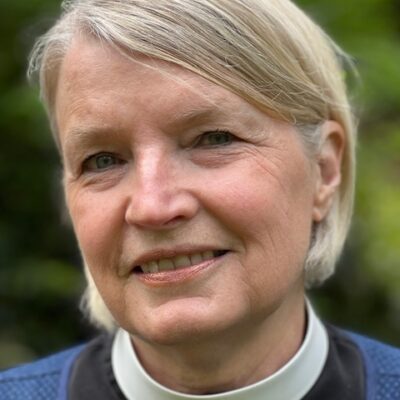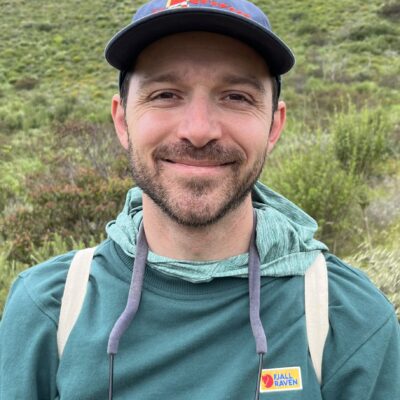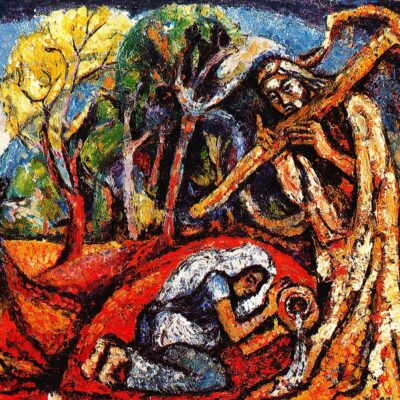Fourth Sunday of Easter / Good Shepherd Sunday
Last September, the Diocese of Olympia came together in Bellevue and consecrated the ninth Bishop of our diocese, a line going back to 1910. There were three missionary bishops before that, going back to 1880, who oversaw Washington State before it was a formal diocese. And before that, there were two missionary bishops who presided over the Washington and Oregon territories, going back to 1854.
Last November, the Episcopal Church installed Bishop Sean Rowe as the 28th presiding Bishop of the Episcopal Church, a line that goes back to William White in 1789. Before that, Americans who were called to the priesthood in the Anglican church, had to go to England to be ordained.
This last Thursday, 133 Catholic cardinals locked themselves in the Sistine Chapel, and under the glories of Michelangelo’s 16th century frescoes, elected Robert Francis Prevost as the 267th Pope, a line that goes back uninterrupted to Peter, the fisherman who began life as Simon, who would become a follower of Jesus as Peter, an apostle of the faith, and the first Bishop of Rome. And so, down one line, a big one, it began. Centuries of continuity and change, leading to the branch of the tree that became the Church of England, and then the Episcopal Church.
Henri Nouwen, and I think others, wrote that Christians are not born, they are made. We must be shown Christ, as John the Baptist exclaimed to Andrew, who then told Simon, “Look, here is the Lamb of God!” So, in thinking about these genealogies, it is not in the way that the seeds and bulbs in the forest descend from the generations before them, each one succeeding naturally from the previous. The faith has to be actively propagated, through example, teaching, and mentorship. We need companions on this journey, a word I recently learned, again, from Nouwen, that has its root in the Latin, “com” meaning “with,” and “panes” meaning bread. So, we learn with and from those with whom we break bread. And we’ve been doing this, uninterrupted, for two thousand years, inside and outside Papal succession.
We each have a path by which we have received the faith, whether or not we can identify its various contours. Your own parents, or grandparents, or books, or fellow parishioners at some point in your life or here at St. Luke’s, the lives of the saints, those in ancient times or those more recent, or the people you serve or serve alongside at Edible Hope. Maybe it’s a long line, or maybe it’s a very short one. Regardless, we hope that it’s a line still being written, as new inspirations and guides continue to appear in our lives.
For me, one beginning was in the wonder at what my Grandma Bo was doing every morning, when we were staying with her or her with us, in going somewhere before anyone else was up, and then coming home with cinnamon rolls as we were beginning to rise. And then, later when I lived in Portland as a 23 year old, I found out where she went, I would occasionally bike the 100 blocks to get to her house by 7:45, not 7:50, and get in her Camry and go to St. Joseph the Worker Catholic Church for a midweek morning service. I’d listen to her whisper my name in prayer, very quickly, among the names of her five children and their spouses and her 13 other grandchildren. And then afterwards I could get whatever donut I wanted with her and a few other wise ladies at the nearby Fred Meyer. This sermon would be a lot better if I could get her counsel today; but my felt understanding of the faith is richer knowing how deeply it existed in her.
There have been many other people who have opened for me windows to see God’s love, within the church and outside it, in my past and in my present and here at St. Luke’s; and I’m grateful to them all. Wherever I am today, in my own relationship with God, I could not be here without each of them, including Britt, and the lay committee that supports me, my companions on the pilgrimage, and anyone who has shown me a kind word or patient interest.
Because Christianity is a religion of giving from that which we’ve received. It is a religion of generosity stemming from gratitude, of love growing forth from being loved.
Nouwen speaks of a “first love,” and all other loves emanating from this first love. We get a picture of this love in the Psalm today, “The Lord is my shepherd, I shall not want. He makes me lie down in green pastures; he leads me by still waters; he restores my soul. He leads me in right paths, for his name’s sake.” We are sheep who have been given everything we need, and are commanded to revel in that abundance. In God, we are whole, and safe.
In the portion of the Gospel of John we heard today, we hear Jesus distinguishing between those who are able to perceive God’s love, and so see it in Jesus, and those who cannot. These religious leaders, despite hearing his teaching and even witnessing his divine works, cling to something, the text doesn’t say what.
There are others, though, Jesus’ flock of sheep, who hear his voice, and follow and are protected by Jesus’ embodiment of the Good Shepherd. The Lord who gives safety and abundance written in the psalm is alive and walking among them, as Jesus establishes the unity of their loving purpose, “The Father and I are one.”
A bit later in the Gospel, we’ll hear Jesus further clarify this unity, this clear channel of love from God the Father through God the Son, “Whoever believes in me believes not in me but in him who sent me. And whoever sees me sees him who sent me.”
Jesus is trying to get his first century disciples and all those who will hear him through the subsequent centuries, back to God. He wants to share with everyone the intimacy that he experiences with God. This surefootedness, this fearlessness, and joy. Nouwen talked about the importance of dwelling in this “first love” because any love worth the name, whether it’s a marriage or intimate partnership, friendship, or in community, cannot come from needing something in return. Or, as Jesus says, in Luke,
“If you love those who love you, what credit is that to you? If you do good to those who do good to you, what credit is that to you? If you lend to those from whom you expect to receive payment, what credit is that to you? Even sinners do all these things, to receive as much again.”
The “first love” assures us that we are complete, just as we are, which enables us to love from a place of abundance. We inevitably don’t expect anything in return; which enables love to become the real gift love can be. Moreover, it’s a love that points to that which made it possible, or even, that which it actually is, which is divine love. We then, like Christ, become a channel of God’s love.
A space in our hearts for this first love might be opened in a dramatic moment of our lives, which we should pay attention to, but we preserve and nurture that space through prayer and service. And as we nurture that love, the importance of our various particularities begin to fall away: the prestige of our job, the price of our car, the success of our family, or whatever else that might seed an anxiety, “Am I enough?” Love has a real hard time growing from this type of scarcity. This is a scarcity that needs to receive God’s love, not be expected or commanded to love. Which is available, to all, in every moment.
I am whole, as I am loved by God. As are you. You are whole, as you are loved by God.
Before any talk of original sin, Nouwen says, we need to talk about original love.
From this wholeness that God offers, we are capable of radical things. A few months ago some of us met during coffee hour and discussed the sermon that addressed Jesus’ exhortation to “love one’s enemies.” We all agreed it was a very high bar, I remember, and I think we settled for some version of taking small steps, with our coworkers or even our families. From the perspective of this “first love,” I’m beginning to see it in a new light. I am not interested in loving my enemies from a great act of courage or will, acting against the movement of my heart. But I am interested in questioning why my heart feels the way it does, about some perceived enemy. Where in my heart do I need to invite God’s shepherd-like presence, and trust in his abundance and protection? What quiet space do I need to open in my day–for prayer, for service–to more deeply feel Jesus’s words, “As the father has loved me, so I have loved you; abide in my love.”
This invitation to abide with God has been coming down to us for two thousand years, within these long lines of succession, and outside of them, in families and communities.
All,
each step of the way,
so that we might know,
that in our hearts,
in any and all moments,
the full embrace of God, through Jesus, is waiting or us, as we are.
I’ll finish with one last encouragement from Nouwen, “Following Jesus is entering more and more into the intimate mystery of God. You are invited to be part of that intimate communion, right now. God became flesh, so that we could be led through him, with him, and in him, in the Glory of God the father, in communion with the Spirit. The spiritual life means that you are part of the family of God. Following Jesus is the way to enter that family of love.”
Amen.







Leave a Reply